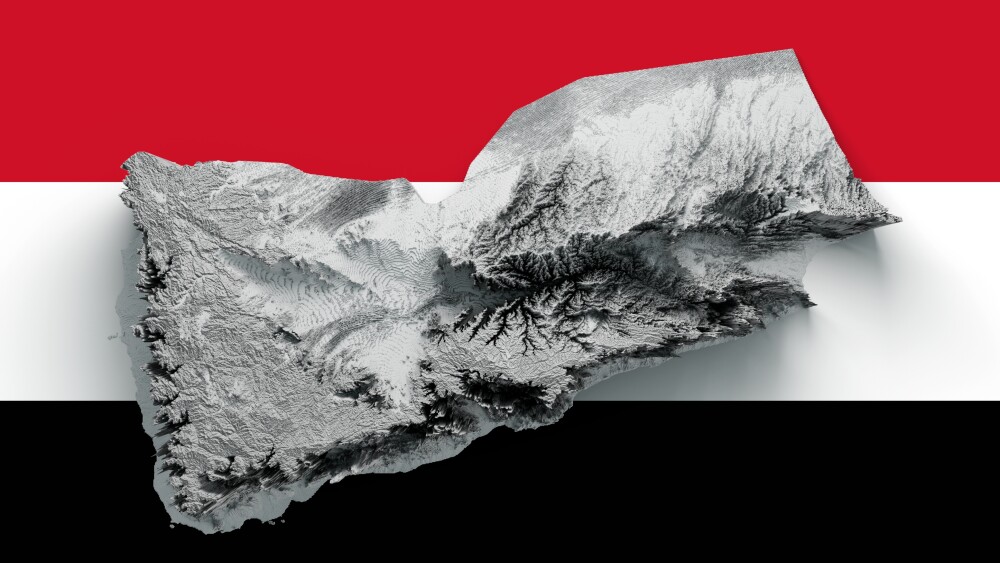On Thursday, August 14, Brigadier General Yahya Sare’e, an official Houthi spokesman, announced the group executed an operation against Israel in response to what Houthis said was the “genocide and blockade imposed by the Zionist entity against the Palestinian people in Gaza.” A hypersonic ballistic missile of the Palestine-2 type reportedly targeted Lod Airport, located in the occupied Jaffa area. The Houthis claimed the operation successfully achieved its objectives, forcing large numbers of people to flee to shelters and temporarily halting airport operations. However, the Israeli military has not confirmed the attack’s impacts, with no reports of casualties or damage provided.
On Wednesday, August 14, the Houthi Foreign Minister, Jamal Amer, met with the Hamas’ representative in Sanaa, Moaz Abu Shamala. During the meeting, Amer received a letter from Hamas’s leader, Dr. Khalil Al-Hayya. The letter conveyed Hamas’s appreciation for the Houthi group’s actions, and their steadfastness in the face of the Zionist enemy and its allies, despite the significant sacrifices, threats, and attacks the group has endured. Hamas affirmed that the geographical distance “did not stop Yemen’s adherence to the Palestinian cause, which is central to the nation.” The letter also praised the steadfastness of the Yemeni position despite the sacrifices and threats.
China’s chargé d’Affaires to Yemen, Zhao Zheng, has publicly denied that advanced drone parts, seized in Aden, were of Chinese origin. In an interview with Asharq al-Awsat, Zheng called these claims “baseless rumors,” and stressed that Beijing enforces strict export controls on military items. The Chinese diplomat flatly rejected U.S. accusations that Chinese companies supply the Houthis. However, a report from The Maritime Executive provides a contradictory account. Security Belt forces reportedly seized prefabricated cranes in Al Hawtah and equipment to build a drone factory in Aden. This equipment, which included parts for short to medium-range drones, was smuggled in containers declared to be holding car parts from a ship arriving directly from China.
Complicating any anti-China actions or messaging, the Yemeni government’s Defense Minister, Lt. Gen. Mohsen al-Dhaeri, met with Chinese diplomatic officials to discuss military and logistical cooperation. A report from the government-run news agency Saba noted that al-Dhaeri specifically highlighted the need for naval capabilities to secure Yemen’s coasts and stop Houthi smuggling operations.
On Tuesday, August 12, Special Envoy Hans Grundberg warned that the situation in Yemen is “deeply fragile” and that “regional turmoil continues to erode prospects for peace.” He noted that although frontlines have barely shifted, the Houthis have fortified their positions and launched a significant assault on government forces in Sa’adah Governorate. Grundberg stressed that unilateral and escalatory decisions risk deepening internal divisions. He also called for an end to Houthi attacks on civilian ships in the Red Sea. During the meeting, Council members voiced grave concern over the conflict. Russia’s delegate linked the Israeli-Houthi conflict to ongoing military operations in Gaza, arguing that a ceasefire in Gaza is necessary to resolve the situation in Yemen. China’s delegate echoed this sentiment, calling for an immediate end to the fighting in Gaza. Greece’s representative specifically mentioned that the Houthis attacked and sank two Greek-owned vessels in early July and demanded the release of the detained crew. The representative also highlighted the importance of Operation Aspides, a European Union naval mission, for safeguarding international shipping.
The government of Yemen appealed to its allies and international organizations for financial and service support. Yemen’s Permanent Representative to the UN, Ambassador Abdullah al-Saadi, stated this support is crucial for consolidating gains and ensuring sustainable recovery, especially in light of the 70% loss in revenue caused by the Houthis’ attacks on oil exports. Al-Saadi thanked Saudi Arabia and the United Arab Emirates for their ongoing development and humanitarian assistance. He also noted that, after eleven years of war, Yemen is at a critical juncture. He accused the Houthis of obstructing peace efforts and perpetuating the conflict, which has led to an unprecedented economic and humanitarian crisis. The government also reiterated its previous complaints to the Security Council about Iran’s “blatant interventions” in Yemen, including continued weapons smuggling and financial and technical support to the Houthi militias. Al-Saadi cited the recent seizure of multiple weapons and drone shipments as evidence of Iran’s ongoing efforts to arm the Houthis as part of an “expansionist project” to destabilize the region and threaten international navigation.

